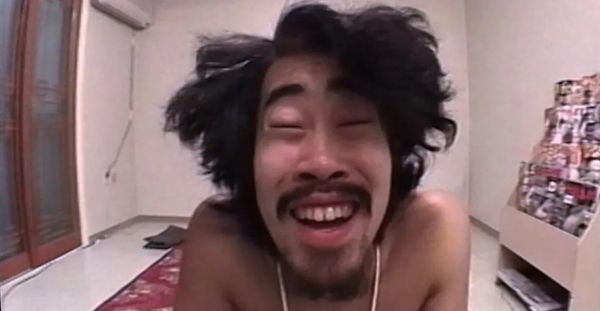Eye For Film >> Movies >> The Contestant (2023) Film Review
The Contestant
Reviewed by: Jennie Kermode

Japanese game shows have long had a reputation for going to extremes, but nothing has quite equalled the scandal surrounding 1998’s Susunu! Denpa Shōnen. Featuring just one contestant, then 23-year-old Tomoaki Hamatsu (now better known as Nasubi), it saw him stripped naked, locked in a room, given a large supply of pens and magazines, and encouraged to enter as many of the competitions in those magazines as possible. He was supplied with water, heating and basic sanitation, but if he wanted to eat, wear clothes, or have anything with which to distract himself from his complete isolation, he had to win it.
Why would anyone agree to this? Nasubi has always wanted to be a star and thought this was his big break, so he was under a lot of pressure. What’s more, he didn’t really take it seriously. And what people who have never seriously been deprived of food, or of balanced nutrition, fail to realise is that it only takes a few days to start seriously screwing with one’s mind. By the time he began to realise the seriousness of his predicament, he was in no state to assert himself, even though he’d been told that he could leave if he wanted to. Sunk cost fallacy kicked in. To leave would have meant that everything he’d already endured was for nothing. Meanwhile, without his knowledge or consent, footage of Nasubi was being streamed live on Nippon TV, destined to become a worldwide fad.
Revisiting these events 25 years later, Clair Titley’s documentary incorporates extensive interviews with Nasubi himself, his mother Kazuko, and series producer Toshio Tsuchiya. We learn about the childhood bullying that gave Nasubi his nickname – it means ‘aubergine’ and was used to refer to his long face, subsequently leading to the use of an aubergine image to obscure his genitals on footage of him naked, and thus contributing to the worldwide adoption of the aubergine emoji to refer to genitalia – whilst setting him up as the perfect victim, longing for approval. We see the effects of decades of worry on Kazuko’s face. Tsuchiya, meanwhile, talks about the whole thing as if it were any other TV programme, with not a hint of remorse.
The programme, as it was screened, may have appeared to be raw and uncensored, but in fact a good deal was hidden. Here we see something of Nasubi’s suicidal musings. We see him running his fingers through his hair as clumps of it fall out because he’s so unwell, and we see worse things. His mental breakdown – the real suffering behind the apparently wacky character fans came to adore – is all too clear. When the series’ cruellest twist comes, it’s devastating. At the same time, watching him creates a sense of awe. The things he managed to do to survive are remarkable.
As we learn about what happened on the programme, we also learn a bit about its audience. This was heavily skewed towards a younger demographic. People who had lived through the war, we are told, were not quite so excited about watching a desperate man struggle to get enough food. We see footage of fans expressing their excitement about the minutiae of Nasubi’s life, this awkward man who became an unlikely hero. Although it isn’t addressed directly, the clever of the structuring makes it clear that this was having a psychological effect on the programme makers. If Nasubi reached his target, they would lose their golden goose. Avoiding that crisis would require them to find new ways of exploiting him.
The Contestant is full of that particularly disturbing strain of human cruelty performed without conscious malice, in which empathy is simply an inconvenience. There is footage of people raising human rights concerns, and yet one cannot help but note that at its height, Susunu! Denpa Shōnen was watched by as many as 17 million people at a time. Not one of them made the effort to bring in the authorities. This raises questions about the way we relate to people we see on television. Do we fully understand that they’re real?
Must it all end in tragedy? Perhaps not. There are numerous twists and turns in this story, some of them astoundingly bleak but some taking the narrative in wholly unexpected, positive directions. Far from being crushed by an experience which would have permanently broken many people, Nasubi went on to reclaim his sense of self in extraordinary ways, making this much more than a story of victimisation (or yet another ‘the real villain is capitalism’ film). Titley handles the pacing perfectly, and her interviewing technique keeps secrets in reserve until the last minute.
An intriguing piece of work which probes the psychology of contestant, producers and viewers alike, Titley’s film explores the extremes of human potential. Its wild, unsettling story makes it compelling viewing throughout and, impressively, it manages to explore this difficult territory without being exploitative itself. It’s one of the most gripping documentaries of the year to date.
Reviewed on: 03 May 2024















